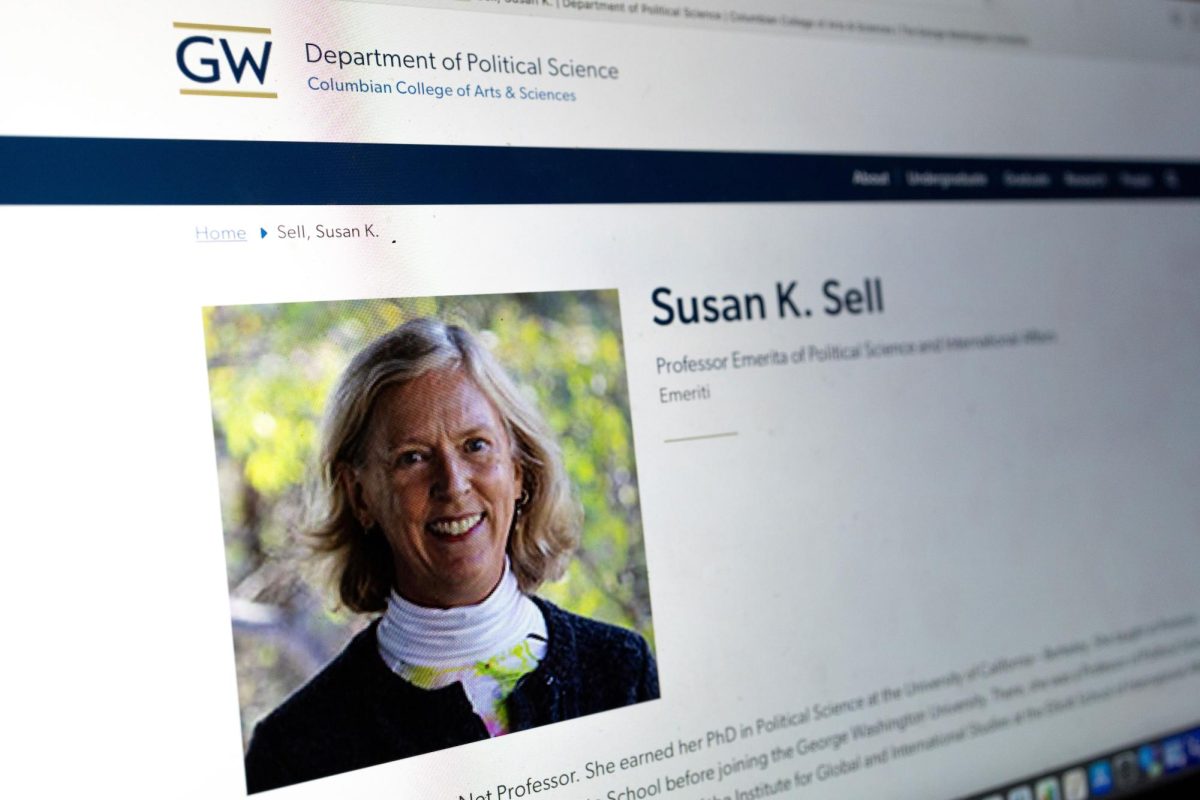Susan K. Sell, a professor emerita of political science and international affairs, died Dec. 24.
Sell taught at the University for 25 years from 1991 to 2016 and served as the director of the Institute for Global and International Affairs at the Elliott School of International Affairs from 2007 to 2012. Her colleagues and friends remember her as a vibrant and witty person and a caring mentor.
Kimberly Morgan, a professor of political science and international affairs, said Sell liked to mentor younger faculty and was a role model for women. Morgan added that Sell cared about helping people who “might not have had a shot” advance in the world.
“She always had an eye on people who were a little marginalized, a little on the outskirts, and she liked to promote people’s ability to advance in the way that they wanted to,” Morgan said.
Sell earned her bachelor’s degree in political science from Colorado College, her master’s degree in political science from the University of California, Santa Barbara, and her doctorate from the University of California, Berkeley, according to her WGBH profile page. After she left GW, Sell worked as a professor at the School of Regulation and Global Governance at Australia National University.
Sell also served on the board of Intellectual Property Watch, a nonprofit that provides information on intellectual property policymaking. She was also appointed to the expert advisory panel for the United Nations Secretary General’s “high-level” panel on public health and access to medicines from 2015 to 2016, per her faculty profile page.
Morgan said Sell helped develop the Political Science department and the Elliott School into the institutions they are today because she joined the department in the 1990s and fostered high expectations for its research, civility and humanity. She said Sell also helped foster connections between scholars and students and organized opportunities for students to attend talks and events at the Elliott School as director of the Institute for Global and International Affairs.
“She was at GW until 2016, and it was a time of real expansion of the University and real expansion of the Elliott School and of the political science department, and she was in on the ground floor for all of that,” Morgan said.
Sell specialized in the field of intellectual property rights, something Morgan said Sell embodied because she was always sticking up for the “little guy” in intellectual property regimes where powerful countries and companies set up operations for their benefit, placing smaller countries and companies at a disadvantage.
“Her work really reflected her overall vision about the world, and it was really important because people were not doing that kind of research when she got into it and so she was a path breaker,” Morgan said.
Morgan, Sell’s neighbor in Maryland, said Sell helped Morgan find her current home when she showed her to a house for sale two doors down from her.
Morgan said her favorite memory of Sell was when they would go running or walking in Rock Creek Park on a trail she calls Susan’s Loop. She said they would take a break during their runs or walks to snack and talk — a time when Morgan said she felt she could talk about anything.
“I forever associate it with her, and it was just a time when we could talk about anything, and sometimes other people would join us, sometimes just us,” Morgan said. “That was really a lovely time to spend together.”
Morgan said Sell’s legacy will be her family, including her two sons, as well as the students that she taught and mentored over the years. She said Sell had an “enormous” network of friends and colleagues who carry her with them.
Morgan added that Sell was a cancer survivor who was active in cancer survivor networks.
“There’s people who carry on her strength and her support. So I think in all those ways, she has an impact in many circles and many people that will live on,” Morgan said.
James Lebovic, a professor of political science and international affairs, said Sell was a passionate and enthusiastic professor who imparted her love for the academic material she taught to her students. Lebovic said Sell would follow her students’ professional lives and celebrate their accomplishments as if they were her own.
“She was the real deal,” Lebovic said in an email. “It set a very high standard for the rest of us.”
Lebovic said Sell embraced life and was an “exceptionally” committed colleague, a selfless and loyal friend, and a one-of-a-kind person. Lebovic added that Sell took on the world in her own style and that he fondly remembers their conversations about pop culture and the people they knew.
“She was smart and funny, folksy and wise, edgy and reflective, and a delightful companion even when you had to struggle to keep up with her,” Lebovic said in an email.
Ingrid Creppell, an associate professor of political science and international affairs, said Sell was a hilarious and “exuberant” person with an adventurous, brave and loving spirit who will be deeply missed.
“She infused the world with curiosity about others and the out-of-the-ordinary, and a commitment to truth, as it can be known,” Creppell said.
Creppell added that Sell had a “prodigious energy” and was a freestyle skier as a teenager.
“She relished flipping and flying through the air on her skis, in terrifying, thrilling performances,” Creppell said.
Nathan Brown, a professor of political science and international affairs, said Sell was a beloved colleague who was “incredibly witty” and who was able to form her academic work on a compassionate basis.
“She was an imaginative scholar and a caring person — and managed to combine those two virtues so that what she had to contribute as an academic was informed by deeply humane sensibilities and what she provided as a friend was insightful,” Brown said in an email.





